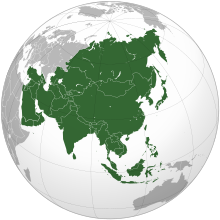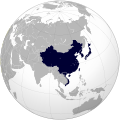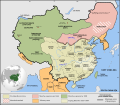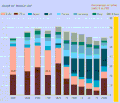
Back بوابة:آسيا Arabic ܬܪܥܐ:ܐܣܝܐ ARC Portal:Asiya Azerbaijani Партал:Азія BE-X-OLD প্রবেশদ্বার:এশিয়া Bengali/Bangla دەروازە:ئاسیا CKB Portal:Asien German Portal:Asya DIQ Πύλη:Ασία Greek Portal:Asia Spanish

 Asia (/ˈeɪʒə/ AY-zhə, UK also /ˈeɪʃə/ AY-shə) is the largest continent in the world by both land area and population. It covers an area of more than 44 million square kilometers, about 30% of Earth's total land area and 8% of Earth's total surface area. The continent, which has long been home to the majority of the human population, was the site of many of the first civilizations. Its 4.7 billion people constitute roughly 60% of the world's population. Asia shares the landmass of Eurasia with Europe, and of Afro-Eurasia with both Europe and Africa. In general terms, it is bounded on the east by the Pacific Ocean, on the south by the Indian Ocean, and on the north by the Arctic Ocean. The border of Asia with Europe is a historical and cultural construct, as there is no clear physical and geographical separation between them. It is somewhat arbitrary and has moved since its first conception in classical antiquity. The division of Eurasia into two continents reflects East–West cultural, linguistic, and ethnic differences, some of which vary on a spectrum rather than with a sharp dividing line. A commonly accepted division places Asia to the east of the Suez Canal separating it from Africa; and to the east of the Turkish Straits, the Ural Mountains and Ural River, and to the south of the Caucasus Mountains and the Caspian and Black seas, separating it from Europe. China and India traded places as the largest economies in the world from 1 to 1800 CE. China was a major economic power for much of recorded history, with the highest GDP per capita until 1500. The Silk Road became the main east–west trading route in the Asian hinterlands while the Straits of Malacca stood as a major sea route. Asia has exhibited economic dynamism as well as robust population growth during the 20th century, but overall population growth has since fallen. Asia was the birthplace of most of the world's mainstream religions including Hinduism, Zoroastrianism, Judaism, Jainism, Buddhism, Confucianism, Taoism, Christianity, Islam, Sikhism, as well as many other religions. (Full article...) Featured articleAngkor Wat (/ˌæŋkɔːr ˈwɒt/; Khmer: អង្គរវត្ត, "City/Capital of Temples") is a Hindu-Buddhist temple complex in Cambodia. Located on a site measuring 162.6 hectares (1,626,000 m2; 402 acres) within the ancient Khmer capital city of Angkor, it is considered the largest religious structure in the world by Guinness World Records. Originally constructed in 1150 CE as a Hindu temple dedicated to the deity Vishnu, it was gradually transformed into a Buddhist temple towards the end of the century. Angkor Wat was built at the behest of the Khmer king Suryavarman II in the early 12th century in Yaśodharapura (present-day Angkor), the capital of the Khmer Empire, as his state temple and eventual mausoleum. Angkor Wat combines two basic plans of Khmer temple architecture: the temple-mountain and the later galleried temple. It is designed to represent Mount Meru, home of the devas in Hindu mythology and is surrounded by a moat more than 5 km (3.1 mi). Enclosed within an outer wall 3.6 kilometres (2.2 mi) long are three rectangular galleries, each raised above the next. At the centre of the temple stands a quincunx of towers. Unlike most Angkorian temples, Angkor Wat is oriented to the west with scholars divided as to the significance of this. (Full article...)Selected Country Cyprus (/ˈsaɪprəs/ ), officially the Republic of Cyprus, is an island country in the eastern Mediterranean Sea, north of the Sinai Peninsula, south of the Anatolian Peninsula, and west of the Levant. It is geographically a part of West Asia, but its cultural ties and geopolitics are overwhelmingly Southeast European. Cyprus is the third largest and third-most populous island in the Mediterranean. It is east of Greece, north of Egypt, south of Turkey, and west of Lebanon and Syria. Its capital and largest city is Nicosia. The northeast portion of the island is de facto governed by the self-declared Turkish Republic of Northern Cyprus. Cyprus is home to some of the oldest water wells in the world. Cyprus was settled by Mycenaean Greeks in two waves in the 2nd millennium BC. As a strategic location in the Eastern Mediterranean, it was subsequently occupied by several major powers, including the empires of the Assyrians, Egyptians and Persians, from whom the island was seized in 333 BC by Alexander the Great. Subsequent rule by Ptolemaic Egypt, the Classical and Eastern Roman Empire, Arab caliphates for a short period, the French Lusignan dynasty and the Venetians was followed by over three centuries of Ottoman rule between 1571 and 1878 (de jure until 1914). (Full article...)Featured biographyChoe Bu (Korean: 최부, 1454–1504) was a Korean diarist, historian, politician, and travel writer during the early Joseon Dynasty. He was most well known for the account of his shipwrecked travels in China from February to July 1488, during the Ming dynasty (1368–1644). He was eventually banished from the Joseon court in 1498 and executed in 1504 during two political purges. However, in 1506 he was exonerated and given posthumous honors by the Joseon court. Choe's diary accounts of his travels in China became widely printed during the 16th century in both Korea and Japan. Modern historians also refer to his written works, since his travel diary provides a unique outsider's perspective on Chinese culture in the 15th century. The attitudes and opinions expressed in his writing represent in part the standpoints and views of the 15th century Confucian Korean literati, who viewed Chinese culture as compatible with and similar to their own. His description of cities, people, customs, cuisines, and maritime commerce along China's Grand Canal provides insight into the daily life of China and how it differed between northern and southern China during the 15th century. (Full article...)General imagesThe following are images from various Asia-related articles on Wikipedia. Featured picture Credit: Samuel Louie The main donjon of Nagoya Castle, a Japanese castle found in Nagoya, Aichi Prefecture. It was destroyed in World War II, but the donjon was reconstructed in 1959, and there are plans to also rebuild Honmaru Palace, which was also located within the castle walls.
Did you know...
Updated: 6:33, 14 February 2024 In the news
Related portalsMajor Religions in Asia Middle East Central Asia and Surroundings Indian Subcontinent Southeast Asia East Asia Selected panorama
Bangalore, is the capital of the Indian state of Karnataka. It has a population of over ten million, making it a megacity and the third-most populous city and fifth-most populous urban agglomeration in India. TopicsCategoriesAssociated WikimediaThe following Wikimedia Foundation sister projects provide more on this subject:
More portalsShortcuts to this page: Asia portal • P:ASIA Purge server cache |
© MMXXIII Rich X Search. We shall prevail. All rights reserved. Rich X Search




























































































